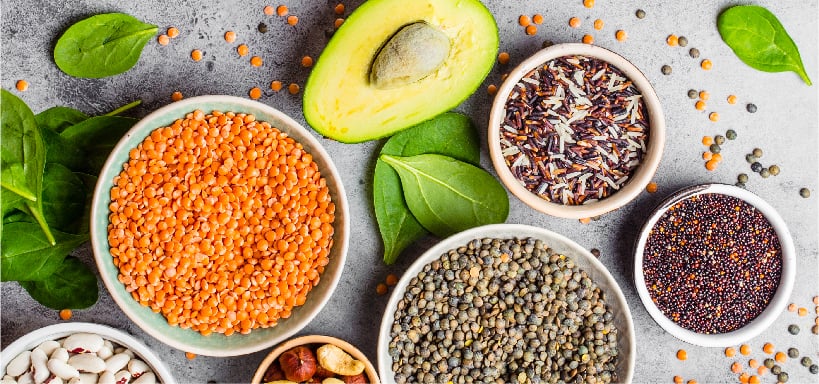
Zinc is an essential trace mineral that plays a role in more than a hundred enzymatic reactions in the body, which is why consuming foods high in zinc is so important.
This mineral (along with iron) is needed in small amounts every day in order to maintain your health and perform important functions. Zinc benefits come from its presence within all bodily tissue — it’s needed for healthy cell division, and it acts like an antioxidant, fighting free radical damage and slowing the aging process.
Zinc deficiency is now known to be a major malnutrition problem worldwide, and inadequate intake of zinc is one of the main causes. According to the World Health Organization, millions of people throughout the world may have inadequate levels of zinc in their diets.
In fact, zinc deficiency is ranked the fifth-leading risk factor in causing disease worldwide. It occurs when you don’t have enough sources of zinc in your diet, or you have trouble absorbing zinc due to digestive disorders or very poor gut integrity.
The good news is that if people consume good sources of zinc daily, like the top 17 sources listed below, they can prevent inadequate levels and reap the benefits of this essential mineral.
Top 17 Foods High in Zinc
Animal products are the best sources of zinc compared to plant foods, like vegetables, because zinc bioavailability (the fraction of zinc that’s retained and used by the body) is high in foods like animal meat and seafood.
Research shows that this is due to the absence of compounds that inhibit zinc absorption in animal sources and the presence of sulfur-containing amino acids that improve zinc absorption, like cysteine and methionine.
Although there are plant-based zinc foods, they’re less bioavailable because of their high content of phytic acid (or phytates), which inhibits zinc absorption. Reports suggest that people who don’t eat meat or animal products, like people on a vegetarian or vegan diet, need up to 50 percent more zinc in their diets daily to absorb what they need.
However, the inhibitory effects of phytic acid on the absorption of zinc can be minimized with methods like soaking, heating, sprouting, fermenting and leavening. Research also shows that the absorption of zinc can be improved by using yeast-based breads and sourdough breads, sprouts, and presoaked legumes.
The best way to achieve optimal zinc levels is to consume two to three servings of these zinc foods per day:
1. Oysters
3 medium-sized oysters: 16 milligrams (145 percent DV)
Although eating oysters should not be done more than once in a while, they are particularly high in zinc. Oysters offer a range of nutrients, including protein and antioxidants, but eating them raw may contain bacteria and contaminants, including heavy metals like mercury and cadmium.
There are healthier ways to get zinc into your diet, though, so stick to eating oysters only occasionally.
2. Lamb
3 ounces: 6.7 milligrams (45 percent DV)
Lamb is a rich source of many vitamins minerals. In addition to zinc, lamb contains vitamin B12, riboflavin, selenium, niacin, phosphorus and iron.
3. Pumpkin Seeds
1 cup: 6.6 milligrams (44 percent DV)
Pumpkin seeds and pumpkin seed oil are a key food for maintaining wellness in post-menopausal women. Pumpkin seeds are also good for the prostate, and they promote your mental well-being.
4. Hemp Seeds
1 ounce: 5 milligrams (34 percent DV)
Not only are hemp seeds rich in zinc, but they are an excellent source of omega-3 and omega-6 fatty acids. They have been found to cause beneficial effects on your cardiovascular system and help keep inflammation at bay.
5. Grass-Fed Beef
100 grams: 4.5 milligrams (30 percent DV)
Grass-fed beef nutrition includes omega-3 fatty acids and conjugated linoleic acid, a powerful polyunsaturated fatty acid that has been shown to help reduce the risk of heart disease, improve blood sugar, discourage weight gain and build muscle. While red meat is known for its very high zinc content, sticking to healthier options like grass-fed beef is ideal.
6. Chickpeas (Garbanzo Beans)
1 cup: 2.5 milligrams (17 percent DV)
Chickpeas, like all legumes, are complex carbohydrates that the body is able to slowly digest and use for energy. Studies show that chickpeas increase satiety and help with weight loss.
They also improve digestion by quickly moving foods through the digestive tract. In addition to garbanzo beans, black beans and edamame are also good sources of zinc.
7. Lentils
1 cup: 2.5 milligrams (17 percent DV)
Lentils are known for their beneficial effects. They are rich in polyphenols and micronutrients, including zinc.
Lentils serve as a plant-based protein, making them an excellent zinc-rich food for vegetarians.
8. Cocoa Powder
1 ounce: 1.9 milligrams (13 percent DV)
READ RELATED: Who Is Catherine Myrie Furniture Restorer? Meet Clive Myrie Wife And Children – What Happened To Her?
Cocoa powder is a good source of two flavonoids, epicatechin and catechin, which function as antioxidants that help prevent inflammation and disease. Research shows that the presence of flavonoids in cocoa powder helps improve blood flow and lower blood pressure, too.
9. Cashews
1 ounce: 1.6 milligrams (11 percent DV)
Cashews are rich in unsaturated fatty acids and high in protein. Studies indicate that cashews nutrition helps fight heart disease, reduce inflammation, promote healthier bones and support healthy brain function.
These nuts help with weight loss or maintenance because they make you feel fuller and curb food cravings. Plus, cashews have a good zinc-to-copper ratio. This helps ensure that both of these minerals stay in balance.
10. Kefir or Yogurt
1 cup: 1.4 milligrams (10 percent DV) (values vary)
Kefir and yogurt are cultured dairy products that serve as probiotic foods. They have been shown to support a healthy balance of bacteria in the gut.
Both kefir and probiotic yogurt support healthy digestion, boost the immune system, promote heart function and regulate your mood.
11. Ricotta Cheese
½ cup: 1.4 milligrams (10 percent DV)
Ricotta cheese is one of the healthiest cheese options because it contains notable amounts of healthy fatty acids and micronutrients, including zinc. Compared to many other cheeses, ricotta has proven to be lower in sodium and saturated fat, and it’s considered a “fresh cheese” because it’s not aged.
12. Mushrooms
1 cup: 1.4 milligrams (9 percent DV)
Proven mushroom nutrition benefits include the ability to boost immunity due to its antioxidant activities and reduce inflammation.
13. Spinach
1 cup: 1.4 milligrams (9 percent DV)
Spinach is one of the most nutrient-dense options in existence. It contains special protective carotenoids that have been linked with decreasing the risk of many diseases, including heart disease, obesity, diabetes, neurodegenerative diseases and even more.
14. Avocado
1 avocado: 1.3 milligrams: (8 percent DV)
If you’re looking for fruits that contain zinc, reach for an avocado. It’s known as one of the healthiest foods on the planet because it’s packed with essential nutrients.
Research shows that avocado consumption is associated with better diet quality and nutrient intake.
15. Chicken
100 grams: 1 milligram (7 percent DV)
In addition to the zinc present in chicken, it’s also a good source of B vitamins, including vitamin B12, niacin, vitamin B6 and pantothenic acid. The vitamin B12 in chicken has been found to help maintain energy levels, boost mood, support a healthy heart and promote healthy skin.
16. Almonds
1 ounce: 0.9 milligram (6 percent DV)
Wondering which nuts are high in zinc? Almonds nutrition is truly remarkable, and many studies show that it benefits many aspects of overall wellness, including cardiovascular function and weight control.
In addition to their zinc content, almonds also provide vitamin E, manganese, magnesium and riboflavin, among other important micronutrients.
17. Eggs
1 large egg: 0.6 milligrams (5 percent DV)
Eggs are rich in nutrients and help protect us against a range of issues, including heart disease, diabetes, macular degeneration and mood disorders. Studies also suggest that eating eggs can help with weight loss.
Related: Foods High in Sulfur and Their Benefits
Benefits
Consuming good sources of zinc regularly is beneficial in the following ways:
- Works as a powerful antioxidant: Zinc helps fight oxidative stress and decrease your chances of developing a number of serious diseases. In fact, zinc supplementation significantly lowered infection rates in participants ages 55 to 87 years in a randomized, controlled trial.
- Boosts eye health: Zinc is needed to covert vitamin A into its active form in order to maintain proper vision. Adequate sources of zinc can help improve night vision and more. This is due to zinc’s ability to reduce oxidation and inflammation, which are associated with diminished eye function.
- Enhances immune function: Studies have shown that humans needs zinc to activate T-cells, which are critical for proper immune function. That is why people who are deficient in zinc tend to more susceptible to a variety of illnesses from a weakened immune system, including the common cold.
- Promotes wound healing: Zinc benefits the integrity of the skin and helps treat infections. Research shows that people who have delayed wound healing tend to have low levels of zinc.
- Balances hormones and supports reproduction: Zinc plays an important role in hormone production. It’s needed for the production of estrogen and progesterone in women, and it has shown to to increase testosterone levels and sperm quality naturally. Zinc is also needed to balance insulin, the main hormone involved in the regulation of normal blood sugar.
- Promotes muscle growth and repair: Studies have found that zinc plays a crucial role in cell division and cell growth, so it’s needed to maintain strength in the muscular and skeletal systems. Eating good sources of zinc daily also helps with the release of testosterone, growth hormone and insulin-like growth factor-1, all of which build muscle mass and help you maintain a healthy metabolism.
- Aids in nutrient absorption: Zinc affects protein synthesis and is needed to use amino acids from food. It’s also involved in the breakdown of carbohydrates, which are some of the main sources of energy for humans. This is why a zinc deficiency can lead to low energy levels and contribute to adrenal or chronic fatigue.
- Promotes cardiovascular function: Research has proven that zinc is needed to maintain the health of cells within the cardiovascular system, while also lowering inflammation and oxidative stress.
Related: Zinc Oxide Benefits for Protecting Your Skin from the Sun + More!
Recipes with Foods High in Zinc
To be sure that you consume enough zinc to avoid a deficiency and experience these benefits, eat two to three servings of foods with zinc daily. Here are some easy and nutritious recipes that will help to boost your zinc intake:
- Steak Fajitas Recipe: These steak fajitas are made with grass-fed beef, plus spices like cumin and paprika, which help fight inflammation and oxidative stress.
- Baked Italian Chicken Recipe: This recipe calls for three zinc sources: organic chicken, mushrooms and spinach.
- Socca Recipe: This Paleo pizza is made with chickpea flour, so it’s a good source of zinc and completely gluten-free. This is a great option for people who follow a vegetarian diet.
- Spinach Artichoke Dip: Use zinc-rich kefir and spinach to make this healthy version of a spinach artichoke dip.
Conclusion
- Zinc is an essential trace mineral that plays a role in more than a hundred enzymatic reactions in the body. It’s needed for proper cell division, and it acts like an antioxidant, fighting free radical damage and slowing the aging process. It also supports immune system function and helps fight the common cold.
- Zinc deficiency is now known to be an important malnutrition problem worldwide, and inadequate intake of zinc is one of the main causes.
- Most foods high in zinc come from animals, such as grass-fed beef, lamb and chicken, but there are also plant-based foods that contain zinc, including chickpeas, avocados and lentils.
- Eating enough zinc boosts immunity, reduces inflammation, fights oxidative stress, supports the heart, promotes muscle growth and helps balance your hormones.
Source:






